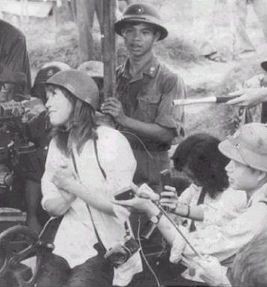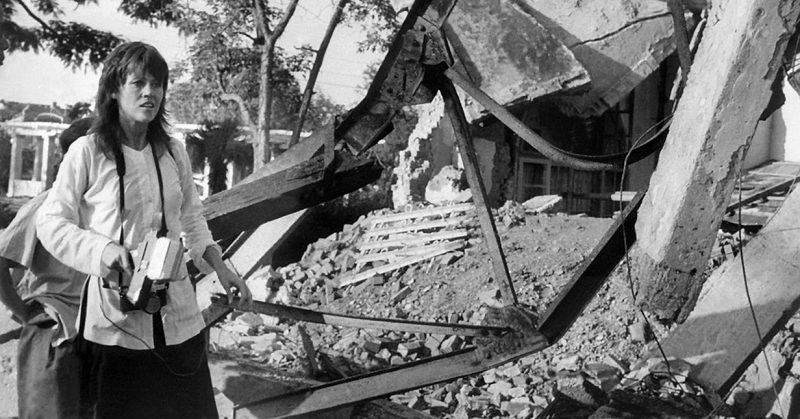Jane Fonda is a world-known actress. She gained her well-deserved popularity in the 60s and 70s, starring in counterculture classics (Barbarella), drama films (They Shoot Horses, Don’t They?) and political thrillers (The China Syndrome). Her diverse acting career was also followed with adventurous escapades in writing, fashion modeling and political activism. Also, Jane Fonda became known as an expert yoga instructor.
Fonda’s role as a political activist came in the 1960s when America was deeply divided on the topic of the ongoing Vietnam War. She supported the Civil Rights Movement and opposed the US intervention in Vietnam. Fonda’s frequent visits to France during the 60s radicalized her views on politics and she became a supporter of the Black Panthers back in the States. She pointed out several times her unreserved support for the movement, calling the Black Panthers “our [US] revolutionary vanguard … we must support them with love, money, propaganda and risk.”
When Native Americans occupied the Alcatraz Island to call for equal rights in 1969, Jane Fonda, along with other celebrities of the time, strongly supported the act.
When Bob Hope initiated the USO (United Service Organization) tour of Vietnam, which brought the soldiers stationed overseas entertainment and support, Jane Fonda, along with fellow actor Donald Sutherland and an anti-war activist Fred Gardner, started the Free The Army Tour (which was often deliberately mispronounced as F*** the Army). The FTA toured military towns along the West Coast, talking to soldiers that were about to be sent to Indochina. These dialogues were recorded and edited into the FTA documentary, released in 1972, containing strong criticism of the war by servicemen and servicewomen.
Fonda’s engagement in the anti-war movement was followed with scandalized disapproval on one side and with standing ovations on the other. She herself admitted making mistakes during her activism during the Vietnam War. On May 4, 1970, Fonda appeared before an assembly at the University of New Mexico, in Albuquerque, to speak on GI rights and issues. The end of her presentation was met with a discomforting silence. The quiet was broken when Beat poet Gregory Corso staggered onto the stage. Drunk, Corso challenged Fonda asking her why she hadn’t addressed the shooting of four students at Kent State by the Ohio National Guard, which had just taken place?
Fonda in her autobiography revisited the incident: “I was shocked by the news and felt like a fool.”
On the same day, she joined a protest march on the home of the university president, Ferrel Heady. The protestors called themselves “They Shoot Students, Don’t They?” — a reference to Fonda’s recently released film, They Shoot Horses, Don’t They? which had just been screened in Albuquerque.
That same year, Fonda became a patron and a sponsor for the Vietnam Veterans Against the War organization, which today campaigns for the rights of all US war veterans. The VVAW is widely considered to be among the most influential anti-war organizations of the American Vietnam War era, and Jane Fonda still bears the title of the Honorary National Coordinator, which she had been rewarded for her support for the organization.
![Fonda at an anti-Vietnam War conference in The Hague in January 1975. By Mieremet, Rob / Anefo - [1] Dutch National Archives, The Hague CC BY-SA 3.0 nl.](https://www.warhistoryonline.com/wp-content/uploads/sites/64/2016/06/Jane_Fonda_1975d-1-640x474.jpg)
Vietnam is a country of many rivers and during the monsoon months, floods are frequent and dangerous. On the one hand, the floods destroy the rice crops on which the country’s economy is based on. On the other, people’s lives were in direct danger from the floods. Thus, the bombing of the drainage dikes could be seen as a war crime against civilians.
Columnist Joseph Kraft, who had also been traveling across, North Vietnam, dismissed these claims stating that the attacks on the dikes by US bombers were sporadic, not systematic. Concerning the issue, Kraft stated, “[If the USAF was] truly going after the dikes, it would do so in a methodical, not a harum-scarum way”.
This argument proved to be insubstantial, since the claim provoked several other investigations, including the official US statement that rejected the claims. The Swedish ambassador in Hanoi claimed that the bombings were, in fact, methodic and a French photographer, Yves Lacoste, confirmed this following an independent investigation he conducted. Whether or not the bombings were conducted in order to disrupt the Vietnamese dam network and deliberately harm civilian population remains unclear to this day. In one of the later publications of Pentagon Papers, it was revealed that President Nixon did, in fact, discuss the option of bombing the dams with his Secretary of State Henry Kissinger. During the discussion, Kissinger concluded that the bombings would cause approximately 200,000 civilian deaths.
The 2,500-mile system, consisting of dikes, dams, levees and sluices was, in response, protected with a network of anti-aircraft guns.
Fonda made radio broadcasts on Hanoi Radio throughout her two-week tour, commenting on her visits to villages, hospitals, schools, and factories damaged in the war and denouncing U.S. military policy in Vietnam. She visited a POW camp where she collected letters from the prisoners and took them to their families.
Fonda was known for her stands, claiming that there was never systematic torture within the POW camps in Vietnam and that it was all an American propaganda effort. This statement in particular caused a lot of controversy in the public and the press.

During her stay in Vietnam, Jane Fonda was photographed manning one of the AA guns, which provoked yet an another outrage in the United States, as the picture seemed to state that Fonda’s political stand was not only anti-war but anti-American as well.
She later denounced the photo, claiming she was manipulated into being depicted that way after a small ceremony in which she participated:
“Here is my best, honest recollection of what happened: someone (I don’t remember who) led me towards the gun, and I sat down, still laughing, still applauding. It all had nothing to do with where I was sitting. I hardly even thought about where I was sitting. The cameras flashed … It is possible that it was a setup, that the Vietnamese had it all planned. I will never know. But if they did I can’t blame them. The buck stops here. If I was used, I allowed it to happen … a two-minute lapse of sanity that will haunt me forever …”
To this day, Jane Fonda remains a prominent activist, speaking out on a range of issues, from the war in Iraq to arctic drilling, equal rights for women, government surveillance and many more besides.
